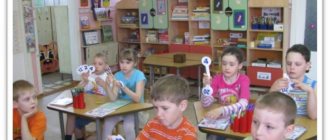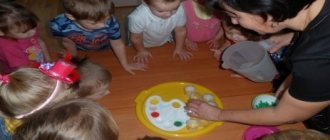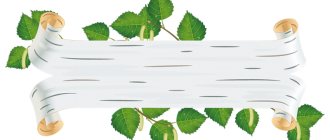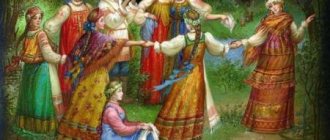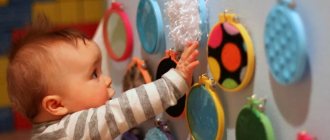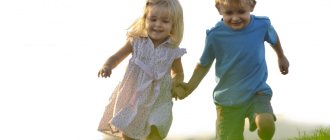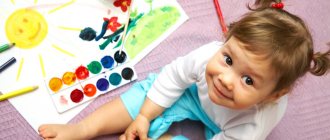Additional literature:
1. “Oral counting in horror stories and funny stories” by T. Rick.
I actually bought all the books of this author. (For the Russian language, I highly recommend her fairy tales)
2. “How to learn the multiplication table. And not only!"
I really liked the book, it has a lot of ideas not only for studying the multiplication tables, but also other school (and not only) information.
Firstly, with the help of this book you will be able to determine the leading type of memory of your child (and any adult) and choose the most suitable memorization methods for him.
Ten best books on mathematics for children
23 | 09/10/2015
Hello, friends.
Today's article will be devoted to books on mathematics, which I actively used in preparation for lessons in Matklass, as well as at home during games and activities with my children.
I'll start with a book that changed my understanding of preschool math. Yes, yes, at first I, like many parents and teachers, was sure that all mathematics before school was numbers, geometric shapes, the basics of addition and subtraction. And only after reading the book “Mathematics and Kids” by A. Zvonkin, I rethought my attitude towards mathematical development before school, and at school too. This is why, when people ask me about books on mathematics, I strongly recommend reading this one first.
Lynnette Long “Great Geometry”, “Great Fractions”, “Great Multiplication”, “Great Division”
From the titles it is clear that the first book is devoted to elementary sections of geometry: area, perimeter, parallelograms, trapezoids, angles, and so on. The second book contains everything related to ordinary fractions. The other two books are about multiplication and division.
It’s great that all the games proposed in the books are “creative and mathematical”. To work, you will definitely need scissors, pencils, crayons, and a ruler. All this makes it possible to “touch” mathematics: to see it not only in boring formulas, but also in our everyday life.
Books from the publishing house Clever: “How to measure history with a rope”, “Fun mathematics”
In my opinion, good mathematical knowledge is not only the ability to solve problems and examples. It is very important how a child navigates well-known mathematical facts. It’s good when a person knows who and how invented the Rubik’s Cube, what fractals or Fibonacci numbers are. These simple topics expand a child's mathematical horizons. They allow you to “be in the know” if necessary, and not just gape while listening to mysterious words (which were not taught at school). These books are just about that: interesting mathematical facts, phenomena, written in popular scientific language. Many adults who are “non-mathematicians” also learn something new.
Mathematical tales by Vladimir Levshin.
These are wonderful educational and, to some extent, scientific books that Vladimir Arturovich Levshin wrote independently and in co-authorship with his wife. In my opinion, the books will be useful not only for children, but also for many “adults in the humanities.” There is probability theory, geometry, the connection between music and mathematics, and all kinds of mathematical tricks, rebuses, and puzzles.
We have this edition from 2013.
Books by Ya. Perelman
I think these books are familiar to many from the times when we ourselves were in school. We had several books by Perelman on physics and mathematics at home. But I remember for sure that I had great difficulty solving many problems. (Despite the fact that I was a prize-winner at city and regional math olympiads). And now, when I look through books, I first of all think about how I can simplify the task so that it becomes accessible and understandable to my 7-year-old son. By the way, using just one problem from Perelman, you can come up with a series of gradually more difficult problems, so that in the end the child will be ready to solve and understand the original version.
Books from the publishing house “White City”
My favorite books from this series are “Math Tales” and “Geometry in Cubes” (I wrote a full review of this set here). The problems from the books by Rachinsky and Evtushevsky are quite complex - in my opinion, for children aged 10-12 years. The collections “Colorful Mathematics” and “Mathematics for Kids,” on the contrary, are very simple. These kits are suitable for children 2-3 years old, but to be honest, the set of tasks is not so large and varied. I used no more than 25% of all materials in my work and just how beautifully designed the cards were...
Books by Zhenya Katz
I regularly use the collection of problems “Mathematics in your hands.” In general, I would make this book a mathematics textbook for grades 1-2. Because it contains normal, interesting tasks, with an adequate level of difficulty for children 7-8 years old. Unlike mathematics textbooks for the first grade, where children are asked to combine 3 oranges with one plum and write it down as an example... What kind of development and learning is there: at least children don’t become dumber in the first 2-3 years of primary school.
I would be glad if you write in the comments about which books help you study mathematics with children!
Sincerely, Ksenia Nesyutina
23
Join the conversation and leave a comment.
- Inna 09.10.2015 at 13:35
Ksenia, can you ask in more detail about the first book (Zvonkin)? I've heard a lot of good reviews about her. At what age will children be able to apply the knowledge acquired in the book?
- Irina 10/09/2015 at 13:48
Very good books by Perelman, certainly too early for kids. But the scary thing is that a 10-year-old reads it, we bought the whole series.
- Love 09.10.2015 at 17:56
Ksenia, I just want to take any games and toys at hand and start laying out possible versions of the tiles, writing fairy tales about zero and running to the bookstore for these books. You inspire. Thank you very much. I want to buy all the books, first of all, the first ones on the list,
- Elena 10/09/2015 at 17:57
Ksenia, hello. Thanks for the selection. I would also like to clarify with you. Is Zvonkin suitable for children who are almost 2 years old? Or maybe you can recommend something else? Thank you.
- Olga 10/09/2015 at 18:02
Ksenia, there is another wonderful book for three-year-olds to get acquainted with mathematics by G.V. Sapgir “The Adventures of Kubarik and Tomatik, or Fun Mathematics.” A classic of the genre, it was recently re-released, but you won’t find it anywhere anymore!
- Viktoria 10/09/2015 at 18:47
We have a book by Alexandrov and Levshin “In the Labyrinth of Numbers”. It is recommended by the publishing house 6+, but you need to take into account that its narration already gives examples of multiplication and division. My 5-year-old son also likes Kumon notebooks from the MIF publishing house. I saw Zhenya Katz’s books on Amazon, but didn’t buy them. Now I read your article and decided to buy them. Thanks for the review.
- Nadezhda 09.10.2015 at 19:22
Ksenia, hello. Thank you very much for the selection. In addition to books published by CLEVER and Linnet Long, fortunately, I already have all these treasures in my library. I think the list is quite sufficient, but I would like to add here “Pie with Mathematics” by Zhenya Katz and her notebooks of logical tasks Unusual Mathematics (for ages from 4 to 7-8 years). I really, really like them. Therefore, having ordered and seen one notebook, I immediately bought the rest for the future. I also dearly love Nikitin B.P.’s book. “Steps of creativity or educational games.” I think that his games with cubes and bricks (on projection) should be a must have for children. After all, we somehow downplay, roughly speaking, the role of geometry, but Nikitin has just such wonderful tasks. Well, in general, this book contains a lot of interesting games, and most importantly, it tells in detail how to make them yourself on a budget. You can read the books on their website: https://nikitiny.ru/knigi-i-statyi-nikitina. I didn’t understand how to insert a photo into the message here, otherwise I would have posted examples of pages from Zhenya Katz’s notebooks for your reference.
- Maria 10/09/2015 at 23:24
Zhenya Kats “Unusual mathematics 4-5 years old.” When I started reading this article, I thought, Ksenia, would you mention Zhenya Katz?))) I was very pleased to see her books on your list!!!
- Ksenia Nesyutina 10/13/2015 at 07:28
Maria, why not? Excellent books indeed. I did not list all the notebooks and manuals for all ages - they can be easily found. Moreover, I use the problem book more actively.
- Ksenia Nesyutina 10/13/2015 at 07:30
Yes, the Nikitins have wonderful books. They are rather just about development, but many are very useful for understanding mathematics in the future.
- Ksenia Nesyutina 10/13/2015 at 07:31
Elena, I read this book when my eldest son was 2 years old. Then I re-read it 3-4 more times as I got older. Every time I found something interesting!
- Irina 10/15/2015 at 09:18
Ksenia, thank you very much!!!! The selection of books is fascinating. Here is a link to Zvonkin A.K. https://jobs.tut.by/applicant/resumes/suitable_vacancies?resume=4c9e03a6ff02b0cbab0039ed1f72436c38316a may be useful to someone.
- Anna 03.11.2015 at 17:28
We like “The Problem Book” by G. Oster. Laughter and mathematics - in one bottle.
- Ksenia Nesyutina 11/07/2015 at 11:18
Anna, thank you! I’ll definitely watch it, I think Auster should have something really funny))
- Natalia 11/17/2015 at 1:24 pm
I noticed on the bookshelf a book by Carol Vorderman, “How to Explain Math to a Child. Illustrated guide for parents" https://www.labirint.ru/books/464072/
How do you like this book? Can you recommend it?
- Natalya 11/20/2015 at 11:35
Good afternoon
I noticed Carol Vorderman’s book “How to Explain Math to Your Child” on your bookshelf. https://www.labirint.ru/books/464072/
How do you like this book and would you recommend it?
- Natalia 12/28/2015 at 12:59
Maxim Kolosov - https://www.labirint.ru/books/427807/
- Ksenia Nesyutina 12/30/2015 at 11:24
Natalya, I didn’t really like the book, so I didn’t include it in the list. I literally used 1-2 ideas on how to clearly explain some things. That is, the pictures and diagrams are very successful. But not everywhere and not everyone, so I can’t recommend it to everyone with a clear conscience.
- Olga 01/10/2016 at 02:35
Good day,
I was looking on the Internet for assignments of algorithms for kids, I came across your site, the first book I see is Zvonkin, it was he who provoked a rethinking of the attitude towards mathematics, or rather, its presentation to children. Thank you very much for such a detailed site, very interesting.
Happy New Year 2021, Olga
- Ksenia Nesyutina 01/13/2016 at 17:53
Olga, thank you! Zvonkin’s book is almost always on my table. I use materials from it both for home games and for classes in MatKlass.
- margarita 02/25/2016 at 18:16
Once again, Ksenia, thank you. To these books, I would add the game methodology of VV Voskobovich’s book by T. G. Kharko “Tales of the Purple Forest” “Numerous game aids and developmental environments have been proposed for this fairy tale. Children are participants in the story that happens to the heroes. I work with children using various developmental methods; Voskobovich’s method is very interesting for children and gives good results.
- Olga Bardina 06/24/2016 at 22:43
Here Svyatoslav loves mathematics, but so far we have only studied using the usual textbooks to prepare for school. Now I’ll replenish our piggy bank.
- Natalya Roshchina 09/19/2017 at 08:54
For little ones, if not scattered fairy tales, namely a book, then the Tale of Numbers by Elena Kostousova, with cards for activities.
Leave your comment
×Cancel reply
